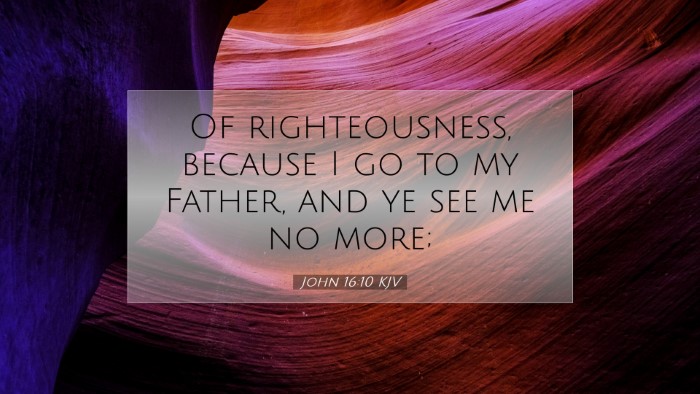Commentary on John 16:10
John 16:10 states: "Of righteousness, because I go to my Father, and ye see me no more." This verse forms part of the discourse of Jesus just before his crucifixion. Within this context, a rich tapestry of theological insight is available by observing the teachings of public domain commentators such as Matthew Henry, Albert Barnes, and Adam Clarke.
Contextual Background
The setting of John 16 is critical as it occurs in the lead-up to Jesus’ Passion. He speaks to His disciples about the coming of the Holy Spirit and the transformation that will take place in their understanding and experience of righteousness through His departure.
The Role of the Holy Spirit
In examining this verse, it is vital to note that the Holy Spirit's role is to convict the world "of sin, and of righteousness, and of judgment" (John 16:8). This triadic conviction serves to orient both believers and unbelievers toward the truth embodied in Christ’s righteousness. Adam Clarke explicates that the Holy Spirit clarifies for the believer the standard by which righteousness is measured—namely, Christ Himself, who fulfilled the law and completely exemplified righteousness.
Righteousness and Christ’s Ascension
Matthew Henry emphasizes that Christ's ascension to the Father is pivotal, as it not only signifies His victory over sin but also affirms Him as the ultimate standard of righteousness. As He departs from earth, believers are led to consider His perfect righteousness in contrast to their own inherent unrighteousness. Therein lies the essence of grace and its transformative power.
The Illustration of Righteousness
Albert Barnes connects the theme of righteousness in this verse to the concept of justification through faith. He interprets "because I go to my Father" as illustrating that through Christ's ascension, He enters into the heavenly realm of perfection, providing a model of the righteousness that believers aspire to. The absence of Christ from the physical realm requires the Holy Spirit to dwell within believers, establishing a deeper understanding and experience of righteousness that transcends traditional obedience to the Law.
Implications for Believers
Pastoral application of this verse is significant. For the modern believer, the departure of Christ and the advent of the Holy Spirit invite a reflection on how one lives out righteousness. The process of sanctification is an unfolding journey guided by the Holy Spirit who instructs and empowers each believer to live according to the greater righteousness that Christ exemplified. Clarke accentuates the necessity of relying on the Holy Spirit for both enlightenment and empowerment, reminding believers that righteousness is not merely a legal status but a lived reality.
Confrontation with Worldly Standards
Jesus’ reference to righteousness challenges the worldly notion of righteousness that is often measured by societal standards. Henry highlights that true righteousness is rooted in divine principles, not human perspectives. The contrast between earthly values and heavenly expectations must be understood within the context of the Holy Spirit's conviction, guiding the Church to remain steadfast in truth.
Conclusion
In summary, John 16:10 encapsulates profound truths regarding the nature of righteousness as revealed in Christ and empowered by the Holy Spirit. The interplay of Christ's ascension, the role of the Holy Spirit, and the believer's response create a holistic understanding of what it means to live righteously in a world often at odds with God's ideals. By synthesizing the insights from Matthew Henry, Albert Barnes, and Adam Clarke, we glean a multifaceted picture that equips pastors, students, theologians, and scholars alike in their pursuit of deeper Christian truth.
Key Takeaways
- Understanding Righteousness: The righteousness addressed in the verse is that which is modeled by Christ and made accessible through the Holy Spirit.
- Christ’s Ascension: His going to the Father reinforces the concept of righteousness as inherent in the divine character.
- Role of the Holy Spirit: The Holy Spirit serves as the guide for believers, convicting and empowering them to pursue holiness.
- Worldly vs. Divine Standards: The challenge to conform to divine righteousness rather than societal expectations remains relevant for today’s believers.


